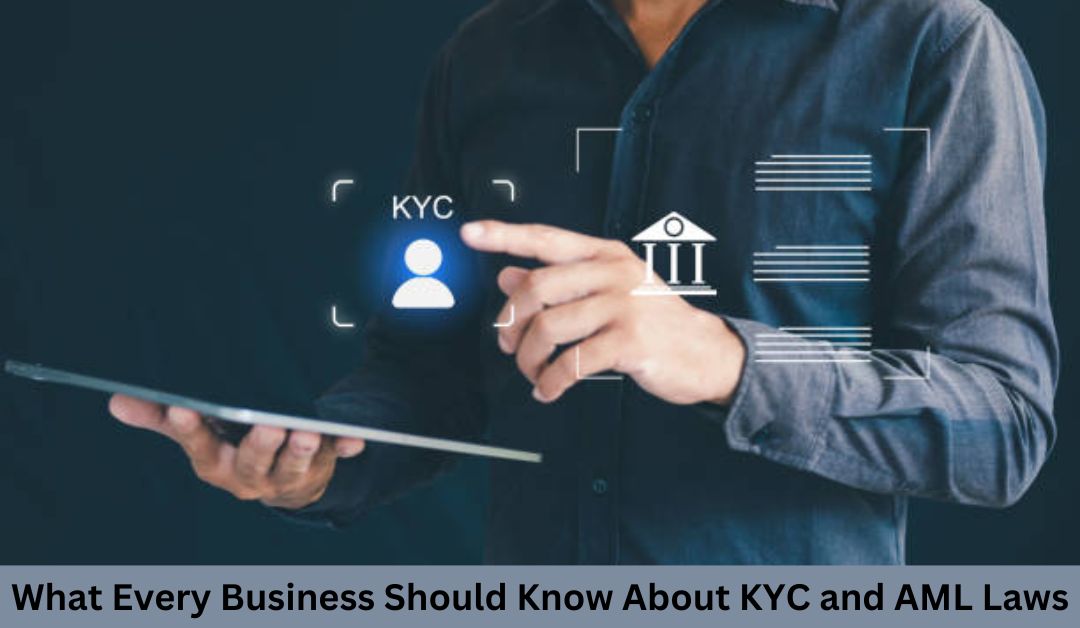Every business that deals with money or financial transactions must be careful to follow certain rules. Two important sets of rules are Know Your Customer (KYC) and Anti-Money Laundering (AML). These rules help stop illegal activities like fraud, money laundering, and terrorism financing. While these rules are most commonly talked about in banks and financial institutions, all types of businesses need to understand them.
What is KYC Compliance?
KYC Compliance is the process of checking who your customers are. It’s a way for businesses to confirm that the people they are dealing with are not involved in illegal activities. This helps businesses avoid fraud, money laundering, or any other crimes that could hurt them.
Why KYC Compliance Matters
KYC Compliance helps businesses make sure they are not unknowingly working with criminals. By checking customer identities, businesses protect themselves and their customers. If a business doesn’t check who their customers are, they might end up getting involved in illegal activities, which can be damaging to their reputation and finances.
Steps in KYC Compliance
To follow KYC Compliance, businesses need to collect information from their customers, such as:
- Full name
- Address
- Date of birth
Sometimes, they also ask for official documents like a passport or driver’s license to confirm identity.
By following these steps, businesses can be more confident that their customers are legitimate.
What is Anti-Money Laundering (AML)?
Anti-Money Laundering Compliance Program (AML) refers to rules designed to stop people
from hiding illegal money. Criminals try to make dirty money look clean by passing it through businesses or banks. The AML Compliance Program helps businesses spot these activities and report them.
Why AML Compliance is Important
AML laws help businesses catch suspicious activities early. When businesses follow these rules, they stop criminals from using their services to launder money. If a business ignores these laws, they could face penalties or lose their customers’ trust.
Key Elements of an AML Program
An Anti-Money Laundering Compliance Program includes things like:
- Checking customer identities: This is where KYC Compliance comes in, by ensuring customers are who they say they are.
- Monitoring transactions: Businesses must keep an eye on customer activities. If something seems unusual, they need to investigate.
- Reporting suspicious activities: If a business spots something strange, like large sums of money without explanation, they must report it to the authorities.
How AML Protects Businesses
By following AML rules, businesses protect themselves from being tricked into helping criminals hide illegal money. If a business notices anything suspicious early, they can stop it before it causes harm.
How KYC and AML Work Together
KYC Compliance and Anti Money Laundering Compliance Program go hand in hand. KYC helps businesses know their customers’ identities. This makes it easier to spot suspicious activities. When businesses know their customers well, they can monitor their behavior and transactions more effectively. If something looks strange, they can flag it as potentially illegal.
For example, if a business sees a customer making large transactions without any clear reason, it could be a red flag. Since the business already knows the customer’s identity through KYC, they can investigate further under the AML guidelines.
Together, KYC and AML help businesses prevent illegal activities and ensure that they are dealing with trustworthy people.
The Importance of KYC and AML for Your Business
Following KYC Compliance and Anti-Money Laundering Compliance Program laws is important for a few key reasons:
- Protecting Your Reputation: If your business is found breaking these laws, customers will lose trust in you. It can harm your brand and cause loss of business.
- Avoiding Legal Problems: Not following these rules can lead to big fines or legal trouble. It’s much cheaper and easier to follow the rules than to deal with the consequences of not doing so.
- Staying Safe from Fraud: KYC and AML help businesses catch fraud and suspicious activity early, so they can take action before something bad happens.
How to Implement KYC and AML Compliance in Your Business
It might sound complicated, but implementing KYC Compliance and Anti-Money Laundering Compliance Program is something that any business can do. Here’s how:
Collect Customer Information
To start, businesses must gather key information from customers. This can include:
- Name
- Address
- Date of birth
- Documents to prove identity
Having this information helps businesses confirm that they are dealing with a real customer and not a criminal.
Assess Customer Risk
Once businesses know who their customers are, they must assess how risky they are. Some customers, like those from high-risk countries or industries, might need more attention. If a business sees any red flags, like a customer making large or unusual transactions, they need to look deeper.
Monitor Transactions
Even after gathering customer information, businesses need to keep an eye on their transactions. If a customer starts doing anything suspicious, like transferring large sums of money without a clear explanation, businesses need to investigate.
Report Suspicious Activities
If a business sees something unusual, it must report it to the authorities. These reports can help prevent money laundering and other illegal activities.
Train Your Employees
Employees should be trained to recognize red flags and understand the KYC and AML rules. Training ensures that everyone knows how to act in case something suspicious is spotted.
Challenges of KYC and AML Compliance
While it’s important for businesses to follow KYC and AML laws, there are some challenges:
- Changing Laws: Regulations change often, and businesses need to stay updated on new rules.
- Time-Consuming: Verifying customers and monitoring their activities can take time, especially for small businesses.
- Costs: Setting up systems for KYC and AML compliance can be expensive, especially if a business has to hire specialists or buy software to help.
- Data Security: Storing customer information safely is very important to protect against hacking or theft.
Despite these challenges, following KYC and AML is necessary to keep a business safe and compliant.
The Risks of Not Following KYC and AML Rules
Failing to comply with KYC Compliance and Anti Money Laundering Compliance Program regulations can have serious consequences:
- Fines and Penalties: If a business doesn’t follow the laws, it can be fined heavily or even face criminal charges.
- Damage to Reputation: Being caught breaking these laws can ruin a business’s reputation, causing customers to leave and making it hard to attract new ones.
- Loss of Business Opportunities: Not following these rules could mean the business is cut off from certain markets or customers who expect high standards of compliance.
Conclusion: Keep Your Business Safe with KYC and AML Compliance
Following KYC Compliance and Anti-Money Laundering Compliance Program regulations is crucial for businesses of all kinds. These laws help businesses avoid fraud, protect their reputation, and stay clear of legal trouble. By taking simple steps like verifying customer identities and monitoring transactions, businesses can build trust with their customers and stay safe from illegal activities. Although it takes effort to implement these rules, the benefits are clear: safer transactions, legal protection, and a trustworthy reputation.





